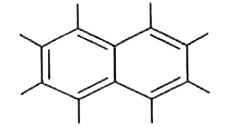Bonding in metal carbonyls is represented by the end structures.
M−C≡O ↔ M=C=OI II
The contribution of I and II to the real structure depends upon the extent of π− back bonding. Both σ donation and π− back bonding are synergitc. The filled orbitals CO overlap with vacant metal d orbitals which is called σ donation. The filled metal d orbitals overlap with π antibondig moleculat orbital of CO. which is called π−back bonding .
Which one of the following has the highest C-O bond length?
A
Ti(C2H5)4
B
Ni(CO)4
C
Cr(CO)6
D
[Fe(CN)6]4−
Video Solution
Text Solution
The correct Answer is:a
Metal - alkyl. No π - back donation . Only σ donor .
|
Updated on:21/07/2023
Topper's Solved these Questions
- BOOK - NARAYNACHAPTER - COORDINATION COMPLEXESEXERCISE - SINGLE ANSWER QUESTIONS29videos
COORDINATION COMPLEXES
- BOOK - NARAYNACHAPTER - CO-ORDINATE COMPOUNDS EXERCISE - Exercise-460videos
CO-ORDINATE COMPOUNDS
- BOOK - NARAYNACHAPTER - D - BLOCK ELEMENTSEXERCISE - CHECK YOUR GRASP7videos
D - BLOCK ELEMENTS
Similar Questions
Knowledge Check
- Question 1 - Select One
Bonding in metal carbonyls is represented by the end structures.
M−C≡O ↔ M=C=OI II
The contribution of I and II to the real structure depends upon the extent of π− back bonding. Both σ donation and π− back bonding are synergitc. The filled orbitals CO overlap with vacant metal d orbitals which is called σ donation. The filled metal d orbitals overlap with π antibondig moleculat orbital of CO. which is called π−back bonding .
Which one of the following has the highest C-O bond length?A[Ti(CO)6]2−B[V(CO)6]−C[Mn(CO)5]+DCr(CO)6 - Question 2 - Select One
Bonding in metal carbonyls is represented by the end structures.
M−C≡O ↔ M=C=OI II
The contribution of I and II to the real structure depends upon the extent of π− back bonding. Both σ donation and π− back bonding are synergitc. The filled orbitals CO overlap with vacant metal d orbitals which is called σ donation. The filled metal d orbitals overlap with π antibondig moleculat orbital of CO. which is called π−back bonding .
Which one of the following has the highest C-O bond length?ATi(C2H5)4BNi(CO)4CCr(CO)6D[Fe(CN)6]4− - Question 3 - Select One
Which of the following metal carbonyl C-O bond length is minimum ?
A[V(CO)6]−B[Mn(CO)6]+C[Cr(CO)6]D[Ti(CO)6]2−
In which of the following metal carbonyls, the C-O bond length is minimum ?
View SolutionIn which of the following metal carbonyls the C-O bond order is lowest ?
View SolutionMaximum pπ−pπ back bonding exists in
View SolutionSynergic bond is a type of back bonding.
Q. Which of the following has higher multiple bond character in M-C bond ?View SolutionNumber of π bonds and σ bonds in the following structure is :
 View Solution
View Solution

